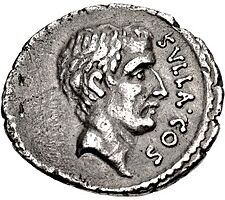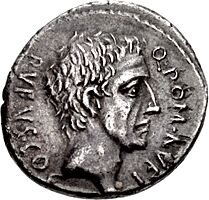Bellum Octavianum facts for kids
Quick facts for kids War of Octavius |
|||||||
|---|---|---|---|---|---|---|---|
| Part of the crisis of the Roman Republic | |||||||
|
|||||||
| Belligerents | |||||||
| Cinnans | Octavius and Senate | ||||||
| Commanders and leaders | |||||||
|
|
||||||
| Strength | |||||||
| Modern estimate: up to 120,000 men | Modern estimate: 60,000 men | ||||||
The War of Octavius was a civil war in the Roman Republic that happened in 87 BC. It was a fight between two important Roman leaders, Gnaeus Octavius and Lucius Cornelius Cinna. Both were "consuls," which was like being a top elected official in Rome. Cinna and his supporters won this war by the end of 87 BC.
The conflict started because Octavius disagreed with Cinna's plans. Cinna wanted to give new Italian citizens, who had recently gained Roman rights after the Social War, more voting power. He also wanted to bring back Gaius Marius, a famous general who had been forced to leave Rome. A big fight broke out in the Roman Forum, and Cinna was forced to leave the city.
Cinna then traveled around Italy to gather an army. Meanwhile, the Roman Senate in Rome replaced him with a priest named Lucius Cornelius Merula. Cinna took control of a Roman army near Nola and was joined by Marius, who had returned from exile. Octavius got help from other Roman generals like Metellus Pius and Pompeius Strabo. Even the Samnites, who were still officially at war with Rome, joined Cinna. Experts believe Octavius had about 60,000 soldiers, while Cinna had around twice that many.
Marius captured and looted the port city of Ostia, which cut off Rome's food supplies. Cinna then began to surround Rome. After some battles, Pompey Strabo, one of Octavius's allies, died from illness. Many of his soldiers then switched sides to Cinna. This forced Octavius to ask for peace. Cinna and Marius entered Rome. They removed many of their opponents from power. Octavius was killed, and Merula took his own life. Cinna and Marius then became consuls. Their group controlled Italy until another civil war started in 83 BC.
Roman Politics Before the War
A big question in Roman politics in 88 BC was how to include the new citizens. These were Italians who had become Roman citizens after the Social War. A law from 90 BC said these new citizens would be put into a few new voting groups. This meant their votes wouldn't count as much as the votes from the older, existing groups. A politician named Publius Sulpicius Rufus wanted to change this. He proposed a law to spread the new citizens among all the existing voting groups, so their votes would have more power.
The consuls in 88 BC were Lucius Cornelius Sulla and Quintus Pompeius Rufus. Sulla was a very successful general. Sulpicius's plan was very controversial. His supporters caused riots in the streets. During one fight, Pompeius's son was killed, and both consuls were driven out of Rome. Sulpicius then passed a law that took away Sulla's important military command. This command was for a war against King Mithridates. Sulpicius illegally gave this command to Sulla's old rival, Gaius Marius, who was not even a public official at the time. This was seen as a big challenge to the consuls' power.
Sulla was very angry. He convinced his soldiers, who were stationed near Nola, to march on Rome. He told them that Sulpicius's law was an attack on the consuls' authority. He also said Marius might replace them with new soldiers, meaning they would lose out on war treasures. All of Sulla's officers left him, except for one. Sulla marched his army into Rome, which was unheard of. His soldiers were almost stopped by angry citizens, but Sulla pushed them forward.
Sulla then called the Senate. He made them declare Marius, Marius's son, Sulpicius, and nine others as outlaws. This meant they were condemned without a trial. Most of them managed to escape Rome, but Sulpicius was caught and killed. Sulla then canceled Sulpicius's laws, saying they were passed by force. This gave Sulla back his command against Mithridates. It also canceled the plan to spread the new citizens among all the voting groups.
After making some other changes, Sulla left Rome to go fight Mithridates. He held elections before he left. However, Sulla was very unpopular. None of his chosen candidates won the elections. Instead, Gnaeus Octavius and Lucius Cornelius Cinna were chosen as the next consuls. Sulla made them promise to uphold his laws, but this promise didn't last long.
The War Begins
When Sulla's time as consul ended, Octavius and Cinna officially became consuls. Cinna quickly tried to stop Sulla from leaving Italy by having a tribune (a public official) try to prosecute him. This failed because Sulla ignored the demands and was protected by his military power. He quickly left for the war against Mithridates. Cinna also brought back his plan to spread the new Italian citizens among all the existing voting groups.
Cinna also wanted to bring back those who Sulla had exiled. These plans caused a big conflict with Octavius. Octavius got most of the tribunes to block Cinna's bills. This led to a riot, where Cinna's supporters attacked the tribunes. After some violence between the two sides, Cinna left Rome to gather an army. Many tribunes and Quintus Sertorius joined him.
When Cinna left, the Senate declared that he was no longer a consul and was an "enemy of the state." They replaced him with Lucius Cornelius Merula, a high priest of Jupiter. Because of his religious duties, Merula couldn't really do his job as consul. This left Octavius as the main consul.
Meanwhile, Cinna went to Nola, where Sulla had left some troops. Cinna convinced the soldiers to listen to him. He took off his consul robes and spoke to them as a regular citizen. He asked them to support his election and argued that if they didn't, the Senate would become too powerful. The soldiers then put Cinna back in his consul's chair and gave him back his symbols of office. The army's officers then swore loyalty to Cinna.
While Cinna gathered more soldiers in the south, Octavius and Merula strengthened Rome's defenses. They also raised troops in the north. Marius, who was in Africa, heard about the conflict. He landed in Italy and joined Cinna. Marius brought about 6,000 men and joined Cinna's camp. Pompey Strabo, another general, was called by Octavius and the Senate to defend Rome. He camped near the city but didn't immediately pick a side.
Surrounding Rome
Cinna's plan was to divide his forces into three groups. His group would camp near the Colline Gate, one group under Sertorius would camp along the Tiber River, and Marius would camp near the city gate towards Ostia. The goal was to starve Rome into giving up. Two groups also attacked other areas. Marius's group captured the port of Ostia, cutting off Rome's supplies. Another group captured Ariminum to stop enemy reinforcements from the north.
Pompey Strabo couldn't agree with Cinna and Marius. He fought Sertorius near the Janiculum hill. The Senate tried to get more soldiers by offering citizenship to all Italians who surrendered. But this only brought in a small number of troops. The Senate then told General Metellus Pius to make peace with the Samnites he was fighting and come help Rome. The Samnites demanded very good terms, which Metellus refused. Cinna, however, agreed to all their demands, gaining their support. Octavius won a battle against Cinna at the Janiculum, but Pompey Strabo stopped Octavius from following up on his victory.
A plague then hit Octavius and Pompey Strabo's armies. Pompey Strabo and thousands of his men died. The Cinnans then continued their plan to starve Rome. Marius captured several towns, while Cinna moved along the Appian Way to secure food supplies. Octavius's troops tried to give command to Metellus, but Metellus refused. Metellus tried to talk with Cinna, but Octavius objected. Metellus then fled Rome for Africa. As Marius tightened the siege, Cinna offered freedom to slaves who would join him. The Senate, fearing starvation in the city, then asked for peace.
The Senate's messengers couldn't get Cinna to answer if they were speaking to him as a consul or a private citizen. Cinna's forces then camped outside Rome's walls. Merula, saying he never wanted to be consul, stepped down. The Senate sent new messengers to Cinna. They asked him to promise not to kill anyone when he entered the city. Cinna refused to promise, but he said he wouldn't cause anyone's death. Marius stood silently beside him. The two men were invited into Rome, but Marius refused, saying he was still exiled. Cinna's first action was to pass a law that canceled all of Sulla's exiles. Marius then entered the city. Octavius refused to flee and was killed in his chair on the Janiculum hill. His head was then displayed in the Forum.
What Happened Next
After his victory, Cinna wanted to punish those who had acted against his laws. Marius, however, focused on his personal and political enemies. These included important figures like Gaius and Lucius Julius Caesar, Publius Licinius Crassus, and the speaker Marcus Antonius. These killings were not widespread and likely showed Marius's personal grudges. The victims were not necessarily linked to Sulla. Merula and Quintus Lutatius Catulus died before their trials were finished. Sulla himself was also declared an "enemy of the state." His laws were canceled, and his property was taken, forcing his family to flee to Greece.
Later writers claimed that Cinna and Marius went on a five-day rampage, killing and destroying throughout Rome. However, these stories are likely propaganda from Sulla's side. Cicero, who lived closer to that time, said that Cinna and Marius only targeted political enemies. They did not threaten all of Rome's people or destroy the city.
At the end of the year, Cinna and Marius presented themselves as the only candidates for consul. They were elected in an unusual way. They became consuls at the start of 86 BC. This was Marius's seventh time as consul. On his first day, he ordered a former tribune to be thrown from the Tarpeian Rock. He started planning his war against Mithridates, but he died within two weeks. Cinna continued to be re-elected as consul until 84 BC. Lucius Valerius Flaccus and then Gnaeus Papirius Carbo replaced Marius as Cinna's co-consul. Flaccus was sent to Greece to fight Mithridates and take command from Sulla.
The government under Cinna started plans for a census, which happened in 86 BC. However, only about 463,000 citizens were registered. This meant that most of the new citizens had not yet been fully registered into voting groups. Despite his earlier promises, Cinna and his allies didn't seem to make much effort to fully register all the new citizens. The threat of Sulla in the east remained. The Roman army sent to replace Sulla fell apart after its general was killed. Cinna himself was killed by his own mutinous troops in 84 BC when he tried to cross into Epirus to fight Sulla. Sulla then returned to Italy in the spring of 83 BC with his veteran soldiers, starting a new civil war.
 | Mary Eliza Mahoney |
 | Susie King Taylor |
 | Ida Gray |
 | Eliza Ann Grier |



